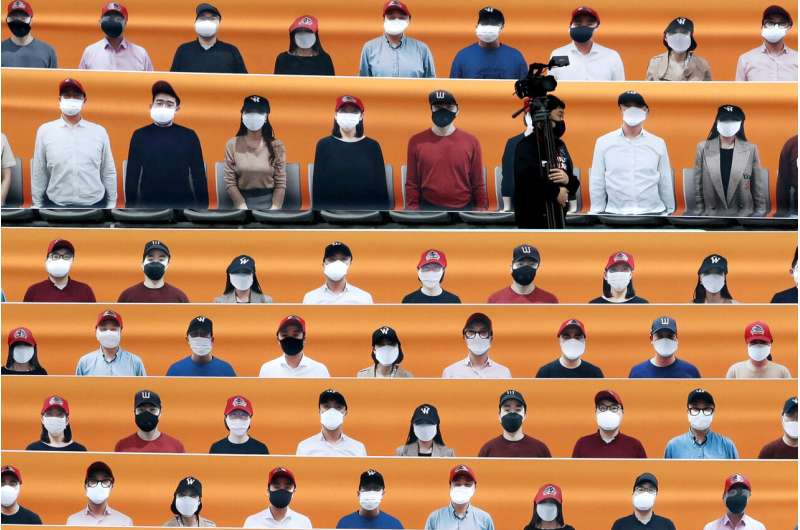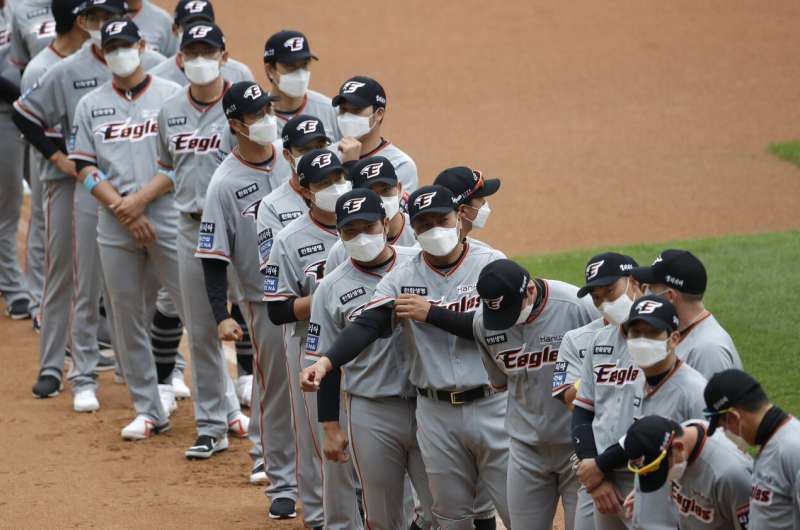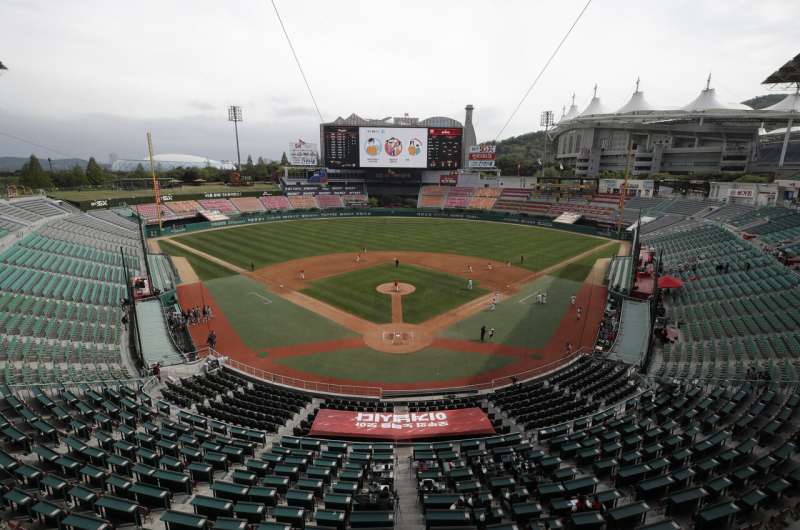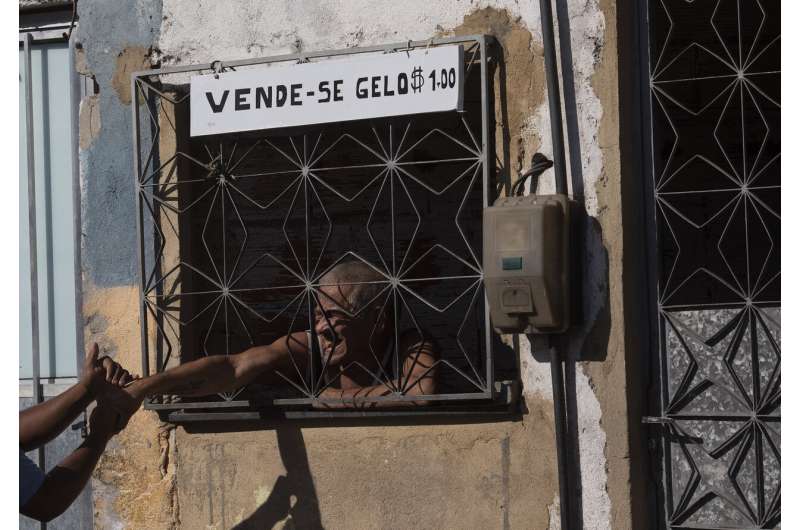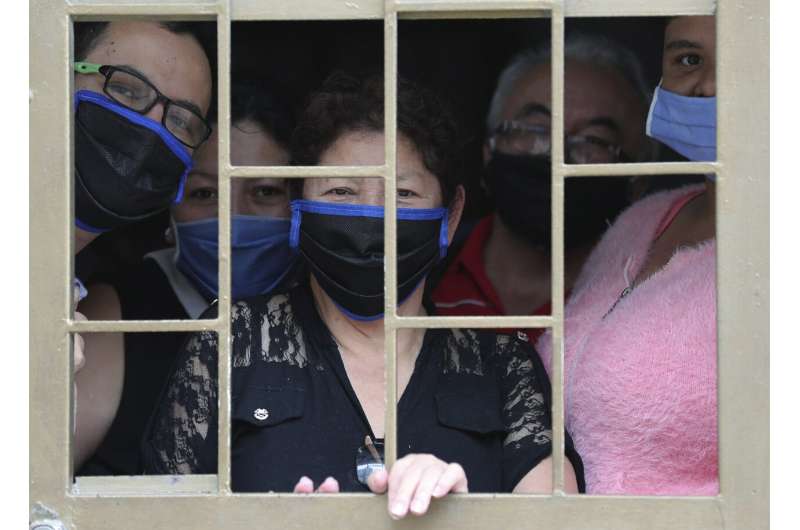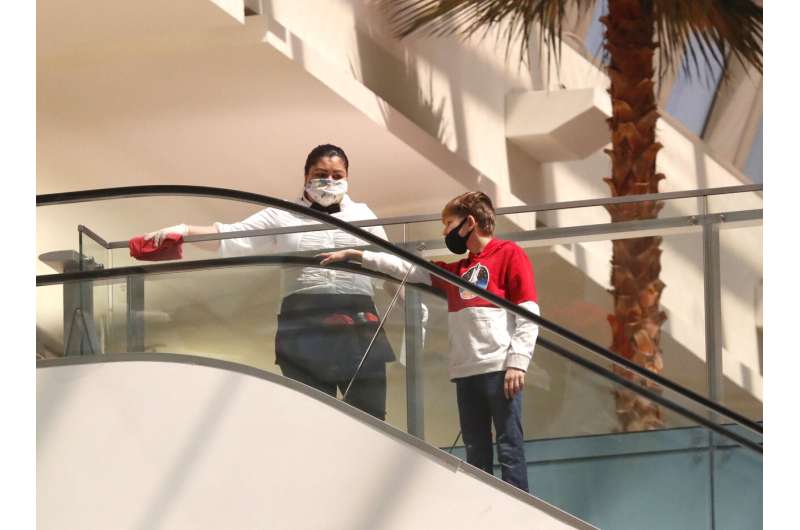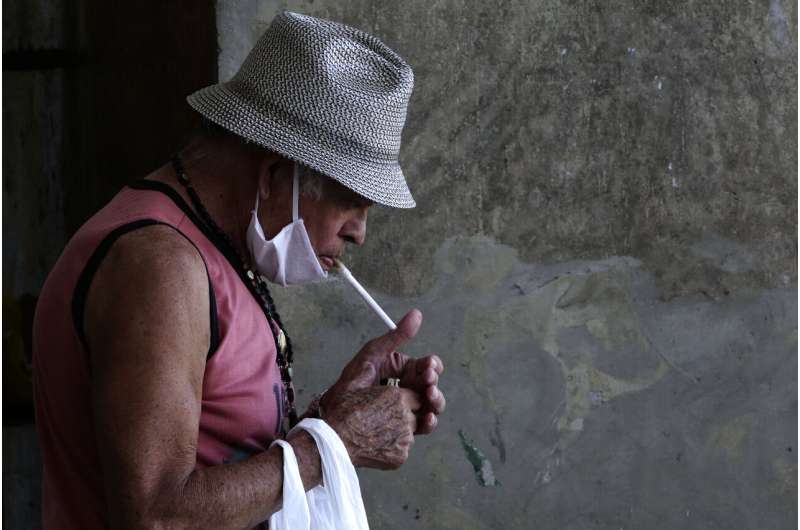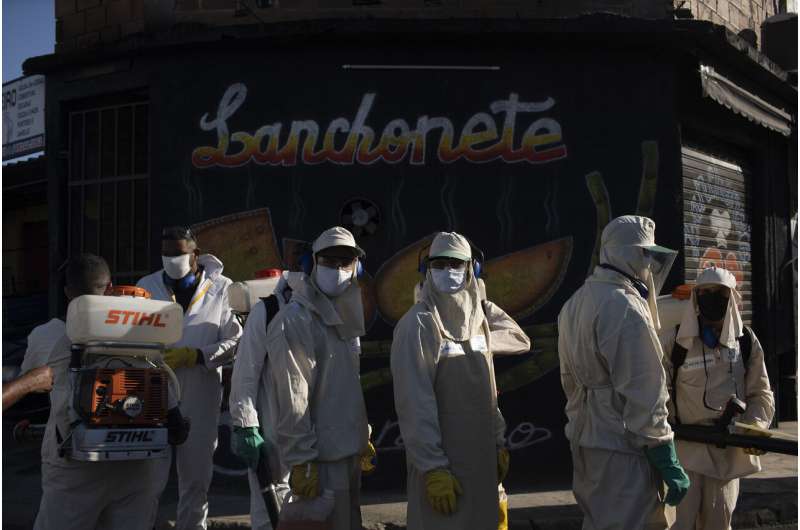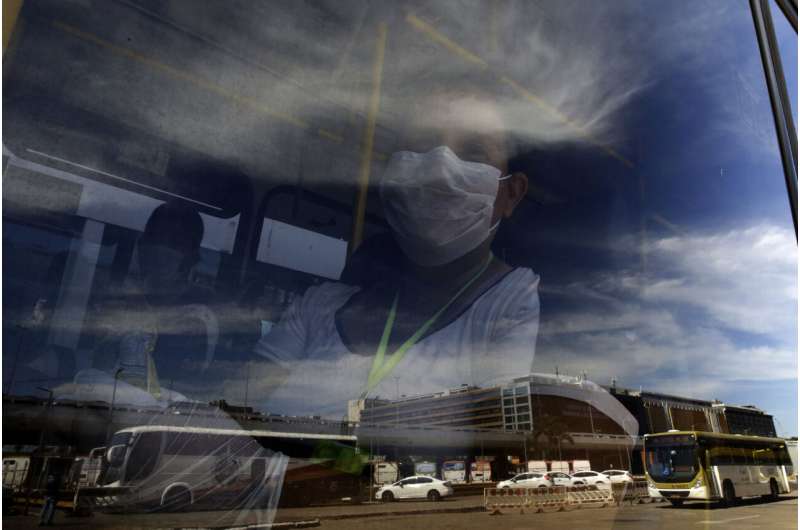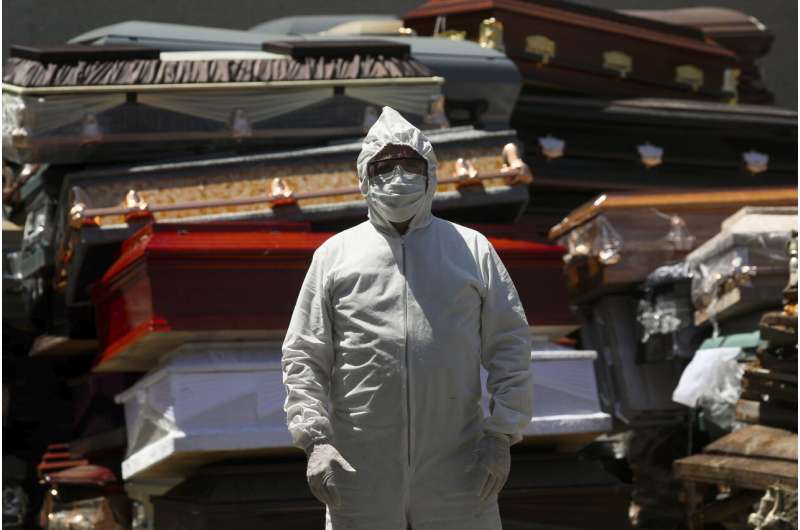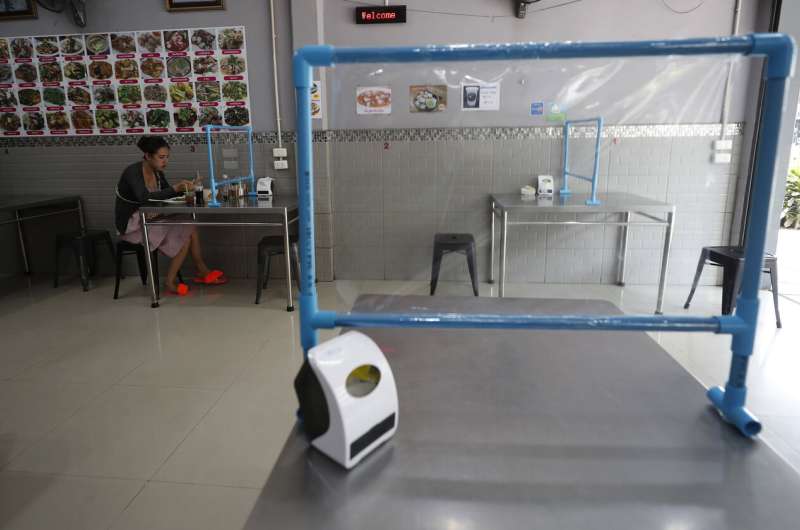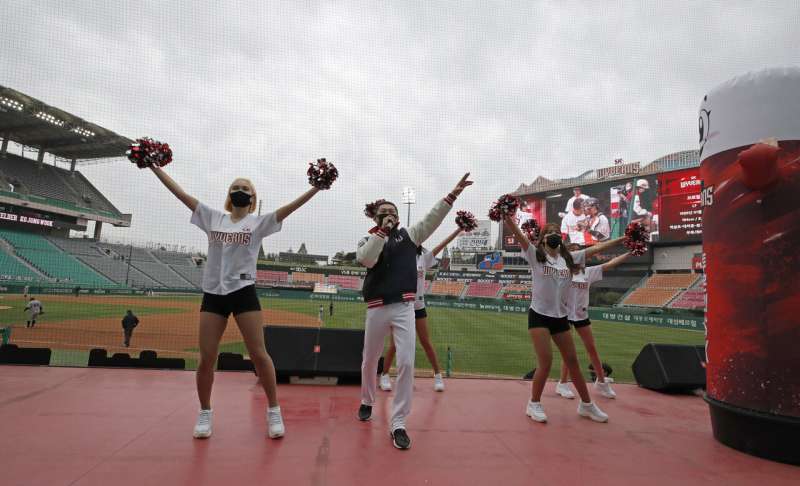A TV cameraman walks through the spectators' seating which are covered with pictures of fans, before the start of a regular season baseball game between Hanwha Eagles and SK Wyverns in Incheon, South Korea, Tuesday, May 5, 2020. South Korea's professional baseball league start its new season on May 5, initially without fans, following a postponement over the coronavirus. (AP Photo/Lee Jin-man)
China and South Korea, which had early, intense outbreaks of the coronavirus, together reported only four new infections Tuesday and were slowly resuming public events after months of containment efforts.
Meanwhile, the U.S. was taking halting steps to lift some restrictions even as thousands of new cases continue to be reported each day.
In Washington, the Supreme Court heard arguments by telephone and allowed the world to listen in live for the first time ever. And the Senate convened for the first time since March, though prospects for quick action on a new aid package are uncertain.
South Korea's three new cases represented the lowest daily jump in nearly three months. More than 10,000 people have been infected in the nation's outbreak, and more than 250 have died.
As cases slow, South Korea will start reopening schools in phases starting with high school seniors next week, and its professional baseball league began its new season Tuesday. Pictures were placed in the stands depicting absent fans, and the stadium was quiet enough to hear cheers and shouts from the dugout.
In China, it has been three weeks since any new deaths have been reported in the country where the pandemic began in December. Just one new case of infection was confirmed, and fewer than 400 patients are still being treated for COVID-19, health officials said. Strict travel restrictions, testing, quarantining and case tracing policies appear to have stemmed the virus as warm weather arrives in much of the country.
Hanwha Eagles players wearing face masks line up during the start of their regular season baseball game against SK Wyverns in Incheon, South Korea, Tuesday, May 5, 2020. Cheerleaders danced beneath rows of empty seats and umpires wore protective masks as a new baseball season began in South Korea. After a weeks-long delay because of the coronavirus pandemic, a hushed atmosphere allowed for sounds like the ball hitting the catcher's mitt and bats smacking the ball for a single or double to echo around the stadium. (AP Photo/Lee Jin-man)
Other places in the Asia-Pacific region have also had success in suppressing outbreaks, including Hong Kong, Taiwan, Vietnam, Thailand, Australia and New Zealand, which has had zero new cases for two days. But some countries like India have escalating outbreaks, and experts say the country with its 1.3 billion population has yet to see its peak.
In the U.S., a shuttered pork processing plant in South Dakota took its first steps toward reopening after more than 800 employees were infected with the virus. California Gov. Gavin Newsom, one of the first governors to impose a statewide stay-home order, announced that some businesses can reopen as early as Friday, with restrictions.
In Louisiana, state lawmakers were restarting their legislature—but feuded over whether they should return at all. Political battles have become increasingly embedded in U.S. coronavirus policy.
A screen showing precautions against the coronavirus is seen during a regular season baseball game between Hanwha Eagles and SK Wyverns in Incheon, South Korea, Tuesday, May 5, 2020. With umpires fitted with masks and cheerleaders dancing beneath vast rows of empty seats, a new baseball season got underway in South Korea following a weeks-long delay because of the coronavirus pandemic. (AP Photo/Lee Jin-man)
The moves to open U.S. states come even as daily new infections continue to exceed 20,000 and daily deaths 1,000, according to figures from Johns Hopkins University.
Governments around the world have reported 3.5 million infections and more than 251,000 deaths, including more than 68,000 deaths in the United States. Deliberately concealed outbreaks, low testing rates and the severe strain the disease has placed on health care systems mean the true scale of the pandemic is undoubtedly much greater.
With pressure growing in many countries for more measures to restart the economy, politicians were trying to boost funding for research into a vaccine for COVID-19. There are hopes one could be available in months, but many scientists warn it could take much longer.
Developing a vaccine will be the key to returning to less restricted everyday life. An alliance of world leaders on Monday pledged to give 7.4 billion euros ($8 billion) for the effort, but the U.S. and Russia were notably absent.
-
A resident greets a water utility worker from CEDAE through his home's window, where he has a sign that reads in Portuguese "Ice for sale," as water workers disinfect the Mare Complex slum in an effort to curb the spread of the new coronavirus, in Rio de Janeiro, Brazil, Monday, May 4, 2020. (AP Photo/Silvia Izquierdo)
-
A family peers from their home's window before receiving boxes of free food during a lockdown to prevent the spread of the new coronavirus in Bogota, Colombia, Monday, May 4, 2020. The city government is distributing food to poor people who can't go out to work. (AP Photo/Fernando Vergara)
-
Amid concerns of the spread of COVID-19, a worker cleans as a young shopper uses a nearby escalator at the Galleria Dallas mall in Dallas, Monday, May 4, 2020. (AP Photo/LM Otero)
-
A man lights a cigarette at a bus station in Brasilia, Brazil, Monday, May 4, 2020. The state government mandated that commuters using public transportation must wear face masks starting Monday. (AP Photo/Eraldo Peres)
-
Water utility workers from CEDAE stand in front of a shuttered restaurant before disinfecting the streets of the Mare Complex slum in an effort to curb the spread of the new coronavirus in Rio de Janeiro, Brazil, Monday, May 4, 2020. (AP Photo/Silvia Izquierdo)
-
A woman peers from behind a bus window parked at a bus station in Brasilia, Brazil, Monday, May 4, 2020. The state government mandated that commuters using public transportation must wear face masks starting Monday to help contain the spread of the new coronavirus. (AP Photo/Eraldo Peres)
-
An employee of Xochimilco's crematorium waits for a corpse, suspected to have died of the new coronavirus, in Mexico City, Monday, May 4, 2020. He is standing next to pile of discarded coffins that contained people who died of COVID-19 disease, and are waiting to be destroyed at the site. (AP Photo/Fernando Llano)
-
Customers eat lunch behind plastic shields to help curb the spread of the coronavirus in Bangkok, Thailand, Tuesday, May 5, 2020. Easing of restrictions in Thailand's capital Bangkok that were imposed weeks ago to combat the spread of the coronavirus, with re-opening restaurants as long as social distancing guidelines are observed. (AP Photo/Sakchai Lalit)
-
SK Wyverns' cheerleaders cheer for their team during a baseball game between Hanwha Eagles and SK Wyverns in Incheon, South Korea, Tuesday, May 5, 2020. With umpires fitted with masks and cheerleaders dancing beneath vast rows of empty seats, a new baseball season got underway in South Korea following a weeks-long delay because of the coronavirus pandemic.(AP Photo/Lee Jin-man)
The money raised will be channeled mostly through recognized global health organizations. French President Emmanuel Macron said he was convinced the U.S. would at some point join the initiative.
Carnival Cruise Line, which saw outbreaks on several ships, plans to start cruises again in August, leaving from Florida and Texas. The Caribbean trips will be the company's first since the pandemic forced a near-total pause in the cruise industry.
In Brazil, President Jair Bolsonaro said he twice tested negative for the coronavirus. Many people, including a federal judge, are demanding he share the actual results, but he has refused.
The standoff is the latest flashpoint in a broader battle between a president who has repeatedly tested the limits of his power and democratic institutions. There are concerns it could spark a constitutional crisis.
Bolsonaro has consistently downplayed the coronavirus pandemic and has fiercely criticized local attempts to control its spread, instead advocating for most people to get back to work. More than 108,000 people have been infected in Brazil and more than 7,300 have died.
© 2020 The Associated Press. All rights reserved. This material may not be published, broadcast, rewritten or redistributed without permission.
